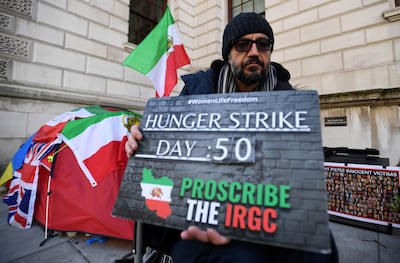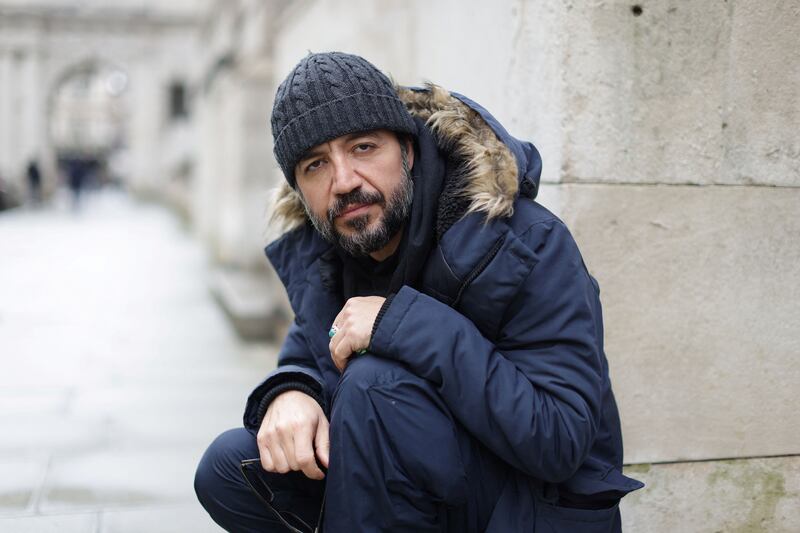Anti-Iranian regime activist Vahid Beheshti said he was inspired to see a show of support for his campaign from inside the country after protesters hung a banner on a Tehran bridge saying “Vahid is our voice”.
The human rights activist, who is a native of Iran, was arrested there twice before escaping to the UK more than 24 years ago.
He has been staging a sit-in protest round the clock for almost a year outside the Foreign Office to call for Iran’s Islamic Revolutionary Guard Corps (IRGC) to be officially listed as a terrorist group.
The banner appeared days after Mr Beheshti returned from a trip to Israel earlier this month where he addressed the Knesset, telling members the populations of both countries needed each other in their fight against Iran’s “terrorist regime”.
He said the “brave people of Iran risked their lives” once again to stage the protest.
He told The National: “[The banner] was hung from one of the bridges in Iran and said ‘Vahid is our voice’ and ‘we stand with Israel’, so they embraced what I said in Israel.”
Mr Beheshti, 46, began his protest outside the Foreign Office last February with a hunger strike, but was forced to call it off after being admitted to hospital in May.
He remains camped outside the building in central London and said attacks on him, both online and in person, have escalated since Hamas launched its assault on Gaza on October 7.
“There are about 40,000 X accounts working against me constantly,” he said.
“The [cyber] attacks have escalated since October 7. Because now I have another crime on top of my crime. My new crime is supporting Israel.
“We have reported a few of them to the counterterrorism police. They arrested a few of them.”
In one of the most serious in-person incidents in mid-October a pro-Palestinian protester taking part in a march threatened to behead him for displaying an Israeli flag at his camp.
“He put his finger on his neck and he said to me 'I am going to cut your neck',” Mr Beheshti said,
When police arrested him they found a big knife in his bag, he said, adding: “There were 120 officers surrounding me to protect me. I was so lucky. I wouldn’t be here talking to you now.”
The incident was one of three attacks he suffered that day.
He said after that the head of the counterterrorism unit in London approached him to persuade him to pause his sit in.
“He came himself here to speak to me and brought all the reasons for me not to be here for four weeks or five weeks,” Mr Beheshti told The National.
“He said then I can come back here. I asked why four weeks? He said for the situation to calm down.

“I said this is a mistake. This is where we are having a problem. It’s not going to calm down. It’s going to escalate. And it has.”
Mr Beheshti said Iran’s attacks on Pakistan and Iraq are part of a strategy to divert attention from the Houthi strikes on Red Sea shipping lanes.
“I am from Iran. It is very hard for people born into freedom here to understand and analyse their culture and the way of thinking. But I know how they act and how they think.
“One of their policies is this: they control crises by creating new crises, to distract the mind of western leaders,” he said.
“This is what they are doing at the moment by attacking Iraq and Pakistan. Their excuse for this is [that] there are some terrorist groups in Iraq and there are some terrorist groups on the border with Pakistan.

“They only do this to deviate the mind from the crisis they are facing in Gaza, in the Red Sea, in the whole region.”
He said the only language the regime understands is “force”.
“This is exactly what Pakistan did. They never expected the quick retaliation of Pakistan. It quietened them down.
“The countries around the region must stop their appeasement policy, which has only made this evil terrorist regime aggressive, day by day.
“I am sorry to say this, I am a human rights activist but we are in a very complicated situation. This regime, this group of people, they only understand force. Nothing else.
“It doesn’t matter what negotiations you go through with them; what peace negotiation, what nuclear negotiation. They have a goal and they’re moving towards that goal.”







